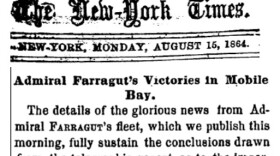The document in which Abraham Lincoln blockaded southern ports, including Mobile, is now part of the late President’s library and museum. The order set in motion the Union's military response to the launch of the U.S. Civil War. The document is now among Illinois' prized papers of the 16th president, thanks to a donation by the state's governor and first lady. APR covered the 150th anniversary of the Battle of Mobile Bay, which occurred after the signing.
The order to blockade Southern ports to prevent the Confederacy from shipping economically vital cotton or importing critical needs was signed April 19, 1861 — one week after secessionist forces fired on Fort Sumter at the entrance to Charleston harbor in South Carolina. The action helped to the so called “Battle of Mobile Bay,” which Alabama Public Radio covered in 2014 for the 150th anniversary of the event. The U.S. Navy’s historical website says..
In his preparations for an attack on New Orleans, (Admiral David) Farragut was reluctant to commit his forces too soon. Despite rumors in the port city of the danger posed by the U.S. Navy, Farragut knew an element of surprise was essential to victory. Farragut wrote to Gustavus Fox, the assistant secretary of the Navy that, “I wish to keep up the delusion that Mobile is the first object of attack.” On 24 April, Farragut successfully ran most of his fleet past the forts guarding the entrance to capture the city. The fall of New Orleans in April 1862 left Mobile as the only Confederate-held port on the Gulf Coast. Farragut’s success earned him a promotion to admiral in July 1862.
His plans for Mobile had to wait after the Federal advance down the Mississippi River stalled north of Vicksburg. It was July 1863 before the fall of Vicksburg and Port Hudson signaled the re-opening of the Mississippi River and an opportunity for Farragut to focus on Mobile. You can click below for some of APR’s stories surrounding the Battle of Mobile Bay.
An anonymous collector who owned the Abraham Lincoln document, blockading Mobile and other Southern ports, put it up for auction, where Governor J.B. Pritzker and his wife, M.K. Pritzker, bought it. The Pritzkers were scheduled to visit the Abraham Lincoln Presidential Library and Museum in Springfield, which will house the artifact, later Tuesday.
"This document — and the museum as a whole — serves as a reminder of how far we've come," the multibillionaire Democratic governor said in a statement obtained by The Associated Press in advance. "Despite our divisions and challenges, more than 150 years later, our nation perseveres."
M.K. Pritzker said the paper is a testament to Lincoln's "unwavering pursuit of justice" and encouraged visiting the museum to examine Illinois' history "and the ways it's intertwined with the history of our nation."
The purchase price was undisclosed, but the document is listed online as sold for $471,000 in July 2023 by Heritage Auctions.
Calling on the Union to flex its naval muscle by shutting off shipping at ports in South Carolina, Georgia, Alabama, Florida, Mississippi, Louisiana and Texas, the "Proclamation of a Blockade" set up the eastern part of Gen. Winfield Scott's scheme to hem in the Confederacy. The western portion had Union troops steaming down the Mississippi River to cut the secession in half. Critics who sought a more aggressive push derisively dubbed it the "Anaconda Plan," conjuring images of a snake slowly suffocating its victim. The name stuck.
Virginia had seceded on April 17, but the state, and North Carolina after it split from the Union on May 20, were added to the blockade order later.
"The horrible violence of the Civil War started with attacks on U.S. forces. President Lincoln had to respond or accept that the nation had been torn in half, condemning millions of people to continued enslavement," Christina Shutt, executive director of the presidential library and museum, said in a statement. "This incredible document represents Lincoln saying America was worth fighting to save."
Lincoln had to step gingerly, for a declaration of war against his own people was loathsome but more importantly would have legitimized the Confederacy as a nation able to establish diplomatic ties internationally. A blockade, he averred, was merely a necessary step to put down an internal insurrection.
The blockade proclamation will go on display in the museum's light- and climate-controlled Treasures Gallery, and will be on display until February 2025.









